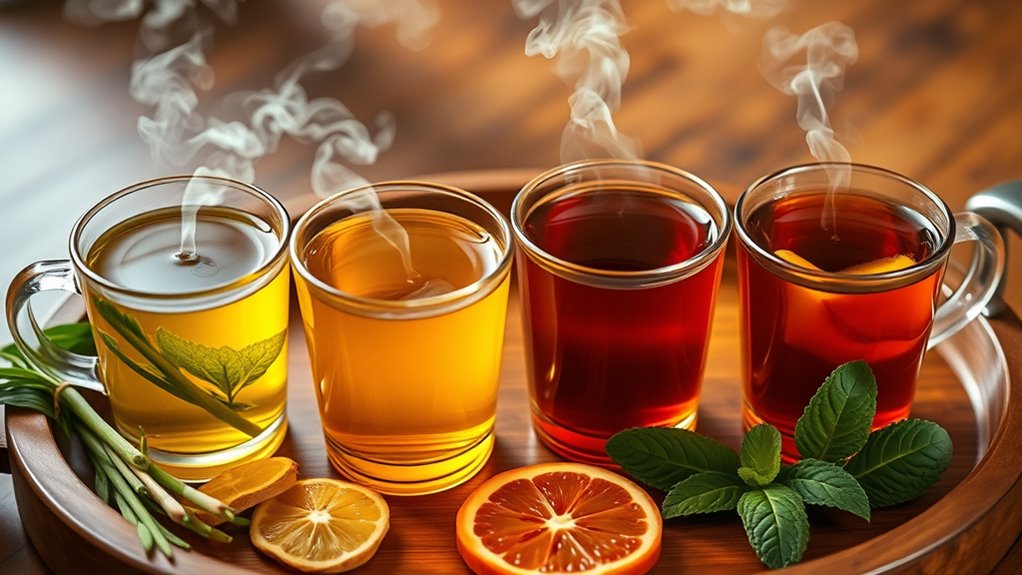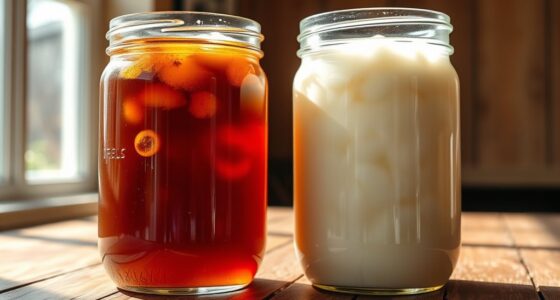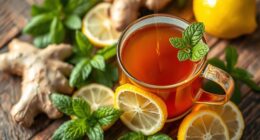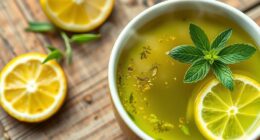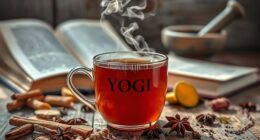If you’re comparing teas for immune boosting, herbal blends like echinacea, ginger, and elderberry are caffeine-free options packed with antioxidants and anti-inflammatory compounds that support your immune system. Caffeinated teas such as green and black tea contain caffeine and catechins, which can boost alertness and immunity but may impact stress levels if consumed excessively. By understanding their ingredients and effects, you can choose the best tea for your health goals—keep exploring to learn more.
Key Takeaways
- Herbal blends like echinacea, ginger, and elderberry are caffeine-free and support immune health with antioxidants.
- Caffeinated teas such as matcha and green tea offer immune benefits alongside alertness and mental clarity.
- Caffeine-free herbal teas provide calming, anti-inflammatory effects ideal for relaxation and recovery.
- The choice depends on balancing caffeine intake with immune-boosting properties of ingredients.
- Consistent consumption of immune-supporting teas can enhance overall health and wellness.
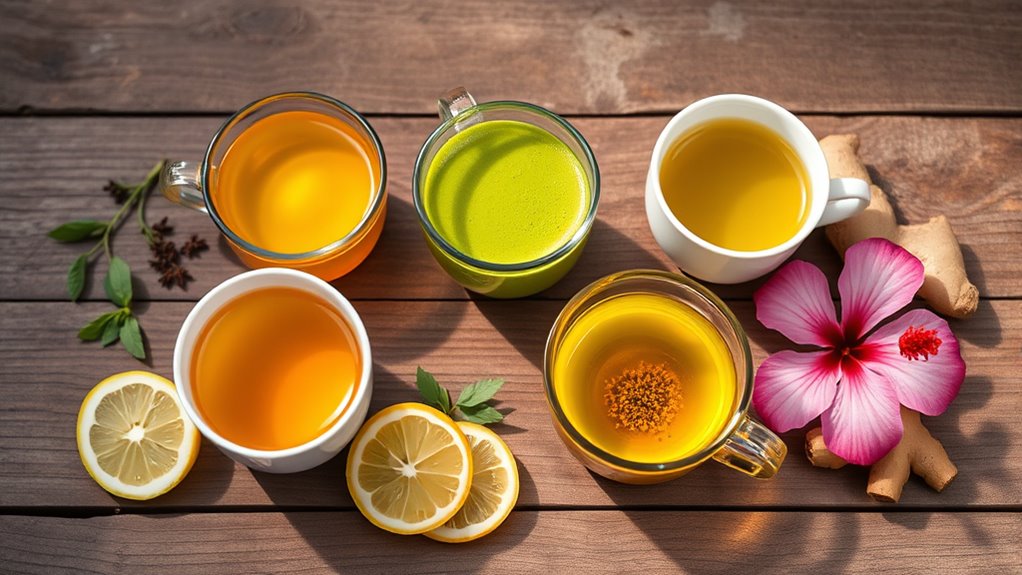
When it comes to strengthening your immune system naturally, choosing the right tea can make a noticeable difference. With so many options available, understanding how herbal blends and caffeine content influence their health benefits can help you make smarter choices. Many herbal teas are crafted from a variety of plants known for their immune-boosting properties, like echinacea, ginger, turmeric, and elderberry. These herbal blends are often specifically formulated to support your immune health, offering antioxidants and anti-inflammatory compounds that help your body fend off illnesses. Unlike traditional black or green teas, herbal blends usually contain little to no caffeine, making them a soothing, gentle option you can enjoy anytime without the jitters or disrupted sleep.
Herbal teas with immune-boosting herbs are soothing, caffeine-free options for supporting health anytime.
Caffeine content plays a vital role in how these teas affect your immune system. For example, black and green teas contain caffeine, which can influence your body’s stress response and alertness levels. Moderate caffeine intake may boost your mood and mental clarity, but excessive consumption can elevate stress hormones and potentially weaken your immune defenses over time. If you’re sensitive to caffeine or need a calming beverage, herbal blends with zero caffeine are ideal because they provide immune-supporting benefits without the stimulant effects. These caffeine-free options often feature ingredients like chamomile or rooibos, which are known for their calming properties and antioxidant content, helping you relax and recover more effectively. Additionally, understanding the balance between caffeine and herbal benefits can help you tailor your tea choices to best support your health goals.
When comparing different teas for immune boosting, consider both the herbal blends used and their caffeine content. For instance, echinacea tea is renowned for its immune-enhancing properties and is usually caffeine-free, making it a popular choice during cold and flu season. Alternatively, matcha, a powdered green tea, contains caffeine but also offers a high concentration of antioxidants called catechins, which support immune health. However, if you’re aiming to avoid caffeine altogether, herbal teas like ginger or turmeric can provide anti-inflammatory effects that bolster your immune response without any stimulant effects.
In essence, your choice depends on your personal health needs and preferences. Herbal blends offer a broad spectrum of immune-boosting compounds, and their caffeine content—or lack thereof—can influence how and when you enjoy them. If you need a gentle, restorative beverage, opt for caffeine-free herbal teas. If you’re seeking a bit of alertness along with immune support, a lightly caffeinated green or black tea might be suitable. By paying attention to these factors, you can select teas that effectively support your immune health while aligning with your lifestyle. Remember that consistent consumption of immune-supporting teas can contribute positively to your overall health over time.
Frequently Asked Questions
Which Tea Has the Strongest Antiviral Properties?
You’ll find echinacea tea has some of the strongest antiviral properties due to its high levels of antiviral compounds. Its potent tea potency helps support your immune system by fighting off viruses more effectively. You should consider drinking echinacea regularly when you’re feeling under the weather, as its antiviral compounds can help shorten duration and severity of illnesses. Overall, it’s a top choice for boosting your immune defenses naturally.
Are There Any Side Effects From Drinking Immune-Boosting Teas?
Think of immune-boosting teas as a double-edged sword; while they can strengthen your defenses, they might also cause side effects. If you’re caffeine-sensitive, you could experience jitters or insomnia. Some teas, like chamomile or mint, may trigger allergic reactions in certain individuals. Always listen to your body, and if you notice adverse effects, reduce intake or consult a healthcare professional to guarantee safe enjoyment of your herbal allies.
Can Tea Help Prevent Common Colds and Flu?
Tea varieties like green, black, and herbal teas can help support your immune response, but they won’t prevent colds and flu entirely. Drinking these teas regularly provides antioxidants and nutrients that strengthen your immune system, making you less susceptible. Keep in mind, though, that a healthy lifestyle and good hygiene are essential. While tea can boost your defenses, it’s not a guaranteed shield against common illnesses.
How Much Tea Should I Drink Daily for Immunity Benefits?
Think of your immune system as a garden that needs regular watering. You should aim for about 2-3 cups of tea daily for immune benefits. Your tea consumption depends on your body’s response and caffeine tolerance, but sticking to this range helps you reap antioxidants and phytochemicals without overdoing it. Keep consistent with your daily intake, and your immune health can flourish like a well-tended garden.
Do Herbal Teas Work Better Than Traditional Teas for Immunity?
Herbal blends often work better than traditional infusions for immunity because they contain ingredients like echinacea, ginger, and turmeric, known for boosting your immune system. Traditional teas, like black or green, provide antioxidants but may lack the concentrated immune-boosting herbs found in herbal blends. For ideal results, choose herbal blends rich in immune-supporting ingredients, and enjoy them regularly to strengthen your defenses naturally.
Conclusion
Choosing the right tea is like planting seeds in your health garden. Each brew offers unique nutrients to strengthen your immune fortress. Whether it’s the fiery kick of ginger or the calming embrace of chamomile, you hold the power to nurture your well-being with every sip. So, pick your warrior wisely—because in the battle against illness, your tea can be the shield that keeps you standing tall, resilient as a mighty oak.

